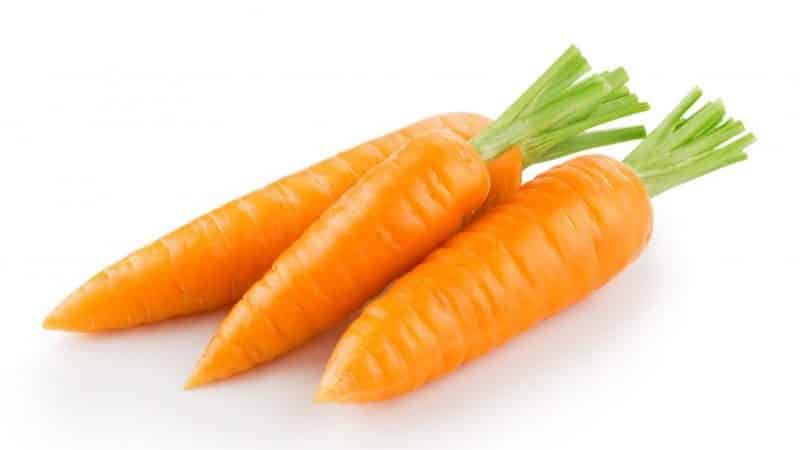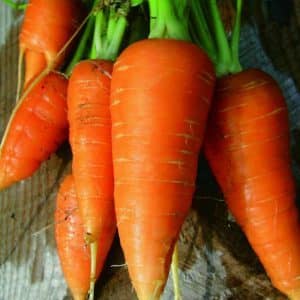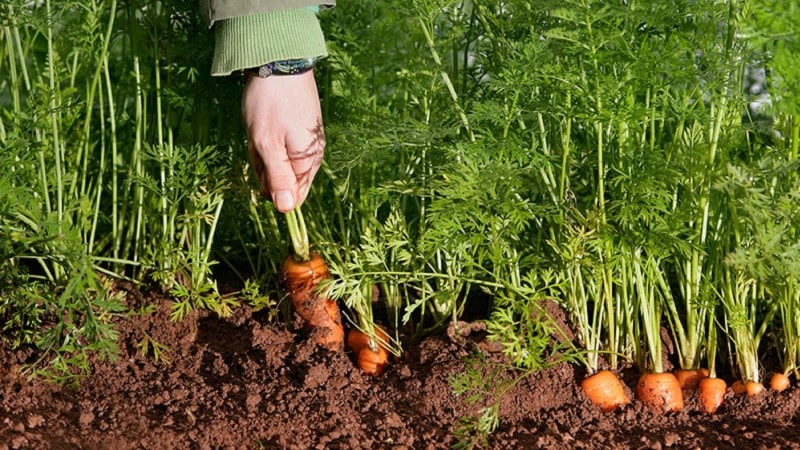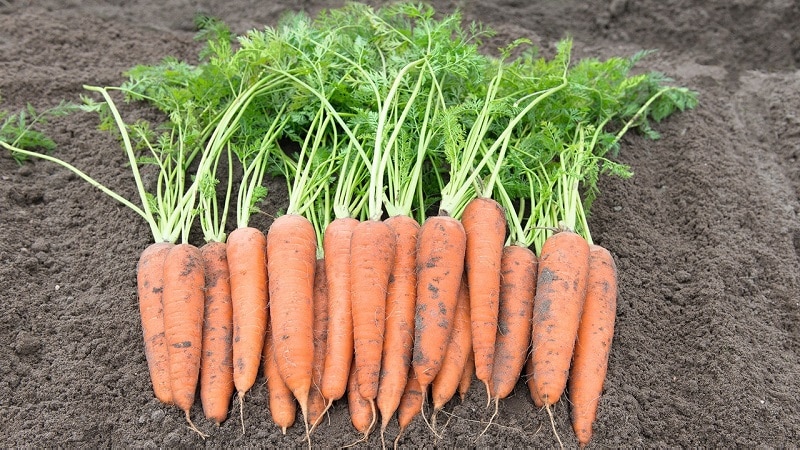Standard French carrot variety Carotel
Karotel is a carrot variety that has been successfully cultivated in Russia for a long time. High yield, disease resistance and excellent taste of root crops are only a small part of the advantages of the crop, thanks to which it has gained popularity among gardeners.
Description of the variety
Karotel is a table variety of carrot. Medium root vegetables have a rich orange color, high carotene content and a pleasant sweet taste.

Origin and development
In the 1970s in France, as a result of breeding work to improve the characteristics of the crop, this variety was created. Later, several more varieties of carrots were developed on its basis: Parisian Carotel, Polar Cranberry, Alenka and Carotel Select. They differ from the original in the shape, size and color of the vegetables.
Reference! The variety is not included in the State Register of Russia.
Composition and beneficial properties
Karotel contains 10–13% beta-carotene, 6–8% sugar, vitamins K, PP, E, C, group B, phosphorus, sodium, zinc, potassium, iron, magnesium, calcium, iodine, fluorine.
Regular consumption of carrots removes harmful substances from the body, has a beneficial effect on the gastrointestinal tract, strengthens the immune system, improves skin condition and the functioning of the cardiovascular and visual systems, kidneys and liver.
Features of application
Karotel carrots are consumed fresh and added to various dishes. Vegetables are used to make juices, purees, baby food and diet food.
Ripening time and yield
This is a mid-early variety: vegetables reach technical maturity 100–110 days after emergence.
Under favorable climatic conditions and proper care, the marketable yield is 7-8 kg per 1 m2.
Disease resistance
The variety is resistant to most diseases characteristic of the crop. However, due to improper care, plants are susceptible to rot and brown spot.
Characteristics

This is a plant with a semi-spreading rosette and green, finely dissected leaves of medium length.
The roots are smooth, cylindrical or cone-shaped with blunt ends, covered with reddish-orange skin. They reach a length of 14-15 cm, weigh about 60 g, but there are also specimens 20 cm long and weighing 120 g.
The pulp is orange crispy, the taste is delicate and sweet.
What regions is it suitable for?
The variety is successfully grown in all regions of Russia, but it feels most comfortable in regions with a temperate climate.
Main advantages and disadvantages
Advantages of Karotel carrots:
- high productivity;

- good transportability;
- attractive appearance and pleasant taste of root vegetables;
- resistance to cracking and major diseases;
- Possibility of winter landing;
- high content of carotene and vitamins;
- long-term storage.
No deficiencies were found in the variety.
Differences from other varieties
Main features of culture:
- resistance to flowering and bolting;
- uniform color of vegetables;
- good keeping quality.
Features of planting and growing
To grow this variety, no specific conditions are required. Seeds are planted both in spring and autumn. At the same time, the basic rules of pre-planting preparation, crop rotation and selection of the optimal location on the site are observed.
Preparing for landing
The seeds are first placed in the refrigerator for 10 days, after which they are soaked in warm water for several hours and then dried thoroughly.
The soil is prepared in the fall: it is cleared of plant residues, dug up and complex mineral fertilizers are applied. If the soil was not prepared in the fall, in the spring, 2 weeks before sowing, it is dug up to a depth of 20–25 cm and enriched with mineral fertilizers.
Reference! Carrots do not respond well to organic compounds, and high concentrations of nitrogen in the soil impair the taste of the root crops.
Soil requirements
The soil must be loose and fertile, have good moisture permeability, aeration and weak or neutral acidity. The best option is sandy loam and loam.
Predecessors
The best predecessors of carrots: cabbage, potatoes, zucchini, green manure, greens, cucumbers. Do not plant the crop after other varieties of carrots, parsley and beans.
Landing dates and rules
The optimal time for sowing in spring is April, when the average daily air temperature will be +15...+18°C. Due to its high frost resistance, the variety is also planted before winter, in October, before frost sets in.
Sowing scheme:
- The beds are prepared on the site, maintaining a distance between rows of 25–30 cm. Planting furrows are made.
- Place the seeds in them at a distance of 2 cm from each other, deepening them by 0.5–1 cm.
- Cover the plantings with polyethylene or non-woven material.
Features of cultivation
The main nuances of carrot cultivation:
- for planting, choose a well-lit place that is exposed to sunlight for most of the day;
- carrots are not planted in lowlands where water accumulates, otherwise the root crops will rot.
Nuances of care
Caring for Karotel carrots involves fulfilling standard agrotechnical requirements: watering, fertilizing, soil care, preventing the development of diseases and pest attacks.
Watering mode
When moistening, they are guided by the condition of the soil: as soon as the top layer of soil dries out, the plantings are watered. On average, this is done once every 7–10 days.
Water consumption per plant depends on its age. The main thing is that the soil is moistened 30 cm deep.
Important! Irrigate the crop regularly: prolonged drought or frequent and abundant watering lead to deformation of the root crops.
Thinning and weed control
If necessary, after the emergence of seedlings, thin out so that the distance between plants is 2-3 cm.
Weed the soil as weeds grow and are taken from the soil useful material and moisture, shade carrots.
Top dressing
Carrots are fertilized only after watering, twice per season:
- 20–30 days after emergence;
- 2 months after that.
The following are used as fertilizers:
- nitrophoska (1 tbsp per 10 liters of water);
- wood ash (2 tbsp. per 10 liters of water);
- a solution of potassium nitrate (20 g), urea (15 g) and double superphosphate (15 g) per 10 liters of water.
Disease and pest control
Despite immunity to the main diseases of carrots, preventive treatment of plantings with a solution of Bordeaux mixture or other fungicidal preparations will not harm.
Among the pests, carrot flies and psyllids most often attack the crop. For prevention, plants are sprayed with infusion of tomato tops or garlic. If insects have already appeared, the plantings are treated with insecticides (Inta-Virom, Actellik).
Harvest and storage

To ensure that the harvest is ripe, several root crops are removed from the ground. If they have reached varietal size and acquired a reddish-orange color, vegetables are dug up.
How and when to collect
The crop is harvested on a warm, dry day, approximately 100–110 days after planting. Carrots are dug up with a pitchfork or shovel or carefully pulled out of the ground, holding them by the tops.
Storage features and shelf life
The collected root crops are cleared of soil, the tops are cut off, dried 2–12 hours in the sun or under cover.
Store carrots in a dark room at an air temperature of 0...+2°C and a humidity of 90–95%. In such conditions, vegetables do not lose their quality all winter.
Reference! To increase shelf life, carrots are placed in boxes, first rolled in a clay mash or sprinkled with a mixture of sand and slaked lime.
Difficulties in growing
The main problems farmers face when cultivating this variety are:
- the appearance of bronze-colored spots on the tops of plants is a sign of an attack by carrot flies;
- drying out and death of seedlings is the result of damage by psyllids;
- Plant rotting is a consequence of excessive watering.
Advice from experienced gardeners

Experienced vegetable growers recommend:
- Create temperature conditions favorable for seeds to germinate and, if necessary, use covering material. The minimum permissible temperature is +4...+6°C, the optimal is +18...+25°C.
- Carefully loosen the soil a day after each watering: this will prevent the formation of a dry crust on the surface of the soil and will improve its moisture and breathability.
Reviews
Farmers who have tried to grow the Karotel variety speak positively about it.
Maria, Tula region: “I am simply 100% confident in this variety.I know that no matter what the weather is, I will still get a rich harvest. Moreover, all root vegetables are always smooth, beautiful and, of course, tasty. So sweet and juicy that even children love them. We eat them fresh and add them everywhere. Even juice We make carrots from Karoteli.”
Evgeniy, Bryansk: “What I like about this variety is its consistency: not once in the almost 10 years during which I have been planting it has there been such a thing that carrots have failed. Vegetables are always tasty and juicy, so I definitely don’t plan to experiment and plant something else.”
Olga, Moscow: “A very long time ago, this variety was recommended to me by a neighbor in the country. I bought a bag of seeds on her recommendation and didn’t even expect that from then on I would stop looking for something else. Karotel is satisfied with everything: it is productive, tasty, and requires minimal care. I didn’t find any shortcomings.”
Conclusion
Karotel is a table carrot variety that differs from other plants in having a lot of positive characteristics and no disadvantages. The universal use of root crops, pleasant taste, excellent commercial quality and long shelf life allow you to grow the crop not only for yourself, but also for sale.